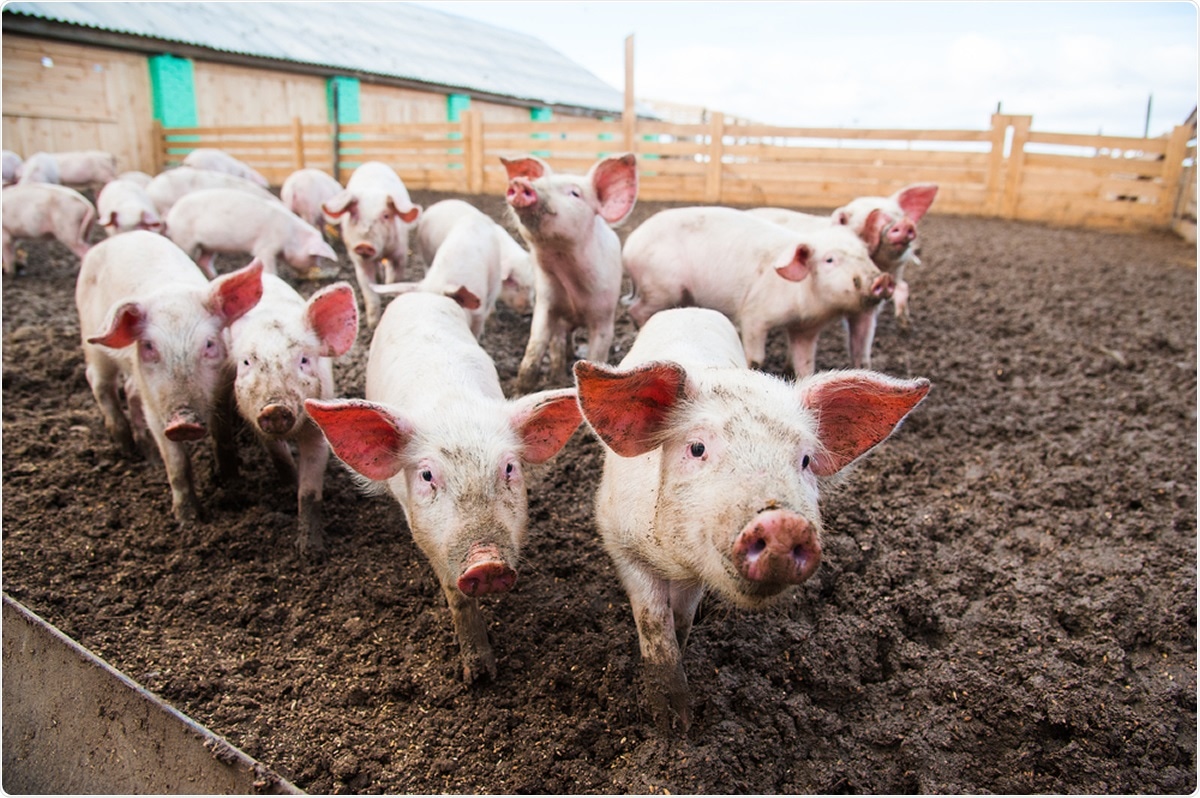Susceptibility of domestic pigs to SARS-CoV-2
by Susha Cheriyedath, M.Sc.A recent study published on the preprint server bioRxiv* by scientists from Canadian Food Inspection Agency, Winnipeg, Manitoba, Canada; University of Manitoba, Canada; and Iowa State University, USA, sought to determine the susceptibility of domestic swine to SARS-CoV-2. Domestic swine is one of the most highly produced agricultural species that has the potential to impact public health significantly. A better understanding of the role played by domestic livestock in SARS-CoV-2 infection and transmission is critical to mitigating the risk of zoonotic transmission.
The authors say, “Determination of the susceptibility of pigs to SARS-CoV-2 is critical towards a One Health approach to managing the potential risk of zoonotic transmission.”

Study: Susceptibility of domestic swine to experimental infection with SARS-CoV-2. Image Credit: SGr / Shutterstock
The Study
Experimental oronasal inoculation was performed in 16 domestic, locally sourced, American Yorkshire crossbred pigs. Two naïve pigs were used as transmission controls and placed in the same room as the inoculated pigs on day 10. The team used 1 uninoculated “farm control” pig that provided negative control tissues.
Physical examination included collection and testing of blood; oral, nasal, and rectal swabs; and nasal wash. These samples were assessed for clinical signs and pathology, viral dissemination in tissues, evidence of virus shedding, and seroconversion. RT-qPCR was used to detect the presence of SARS-CoV-2 in whole blood. The development of neutralizing antibodies to SARS-CoV-2 was monitored throughout the course of the study.
What did they find?
The team found that pigs that underwent experimental inoculation were susceptible at low levels to SARS-CoV-2 infection. Overall, there was no observable respiratory distress in these animals, and the temperature of the animals remained normal throughout the study period. The two naïve pigs that were in contact with the inoculated pigs from day 10 onwards showed no indication of viral infection at any point during the study. Of the 16 animals experimentally inoculated, 5 showed some level of an immune response to SARS-CoV-2, which represents about 30% of the study cohort.
Viral RNA was detected in nasal wash and oral fluids in 2 animals, and the live virus was detected in 1 pig. Moreover, antibodies to SARS-CoV-2 was detected in 2 pigs at 11 and 13 days after infection, while oral fluids collected 6 days after inoculation showed the presence of secreted antibodies. While 1 pig displayed mild symptoms, including coughing and depression, multiple pigs had mild ocular and nasal discharge during the immediate, post-infection period.
Relevance of these results
The clinical data gathered by this study provides evidence for the presence of live SARS-CoV-2 virus in swine for a minimum of 13 days after inoculation. The discovery of the presence of secreted antibodies in oral fluids may be helpful in surveillance efforts. It may also mean that human saliva testing could serve as a less invasive diagnostic method along with serosurveillance studies conducted to detect SARS-CoV-2 infection.
“These data highlight the need for additional livestock assessment to better determine the potential role domestic animals may contribute towards the SARS-CoV-2 pandemic.”, say the authors
The findings of this study contradict previous study reports that indicated swine are not susceptible to infection by SARS-CoV-2. In studies conducted earlier, viral RNA was not detected in swabs or tissue samples, and there was no seroconversion. This may be because of the variations in viral isolate, infectious dose, age of animals, or breed of swine. All of these factors could affect study outcomes. It is worth noting that this study used a 10-fold higher viral dose for experimental inoculation compared to that of previous studies. All these findings emphasize the need for further investigations into the susceptibility of domestic livestock species to assess the roles they play and the risks they pose in the spread of the disease.
“Finally, we emphasize that no cases of domestic livestock have been documented by natural infection to date; however, the results of this study support further investigations into the role that animals may play in the maintenance and spread of SARS-CoV-2.”
*Important Notice
bioRxiv publishes preliminary scientific reports that are not peer-reviewed and, therefore, should not be regarded as conclusive, guide clinical practice/health-related behavior, or treated as established information.
Journal reference:
- Susceptibility of domestic swine to experimental infection with SARS-CoV-2 Brad S. Pickering, Greg Smith, Mathieu M. Pinette, Carissa Embury-Hyatt, Estella Moffat, Peter Marszal, Charles E. Lewis bioRxiv 2020.09.10.288548; doi: https://doi.org/10.1101/2020.09.10.288548